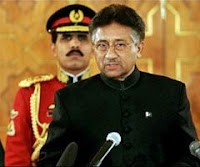Pakistan Lifts State Of Emergency
 Pakistan President Pervez Musharraf lifted a national state of emergency on Saturday after making last-minute changes to the constitution to strengthen his hand against the courts and parliament.
Pakistan President Pervez Musharraf lifted a national state of emergency on Saturday after making last-minute changes to the constitution to strengthen his hand against the courts and parliament.Amid months of political turmoil and the stiffest challenges to his rule since he seized power in a 1999 coup, the government announced his unpopular emergency rule was over and that the constitution was no longer suspended.
"The emergency is lifted. President Musharraf has signed the order repealing the state of emergency," government spokesman Anwar Mahmood told AFP.
Just three weeks before new elections for parliament, analysts say, the lifting is unlikely to quell deep discontent over his handling of a political crisis that first erupted when he took on the country's lawyers in March.
The president was to deliver a live address to the nation at 1500 GMT.
Musharraf put Pakistan in a state of emergency on November 3.
The constitution was suspended, thousands of people were jailed, uncooperative judges were sacked and tough new curbs were slapped on the media.
He cited the surge in militant violence as well as what he said was interference from the courts when he imposed the emergency, which came one month after his controversial re-election to the presidency.
Opponents alleged the real reason was to provide cover for a purge of anti-Musharraf judges, who could have entertained legal challenges to his election as president while he was still head of the nation's military.
He has since resigned as military chief as promised, but said in an interview released on the Washington Post website on Saturday that the sacked judges would not get their jobs back. "New judges are there," Musharraf said. "They will never be restored."
Late Friday, Musharraf authorised a raft of last-minute amendments to the constitution - including one to block the next parliament from challenging the legality of the emergency order or trying to undo its provisions.
Under the constitution a two-thirds majority in parliament is needed for any change, and critics insist that the amendments and the weeks of emergency mean the January 8 election for parliament cannot be free or fair.
Curbs on the media introduced during the emergency - including a ban on all live TV broadcasts, and anything that "defames" Musharraf or the armed forces - remain in place.
"Musharraf's so-called return to constitutional rule provides legal cover to laws that muzzle the media and lawyers," Ali Dayan Hasan, of US-based activist group Human Rights Watch, said Saturday.
Lawyers have been at the heart of the country's political turmoil since March, when Musharraf tried to suspend the chief justice of the Supreme Court, Iftikhar Muhammad Chaudhry. That move, later overturned by the Supreme Court, led to massive street protests.
The president eventually succeeded in dumping Chaudhry but he has also been faced with a wave of violence, mostly targeting the military, since an army raid on a radical, pro-Taliban mosque in July left about 100 people dead. Since then, a sharp increase in attacks has added to the death toll from militant bloodshed - almost 700 people have been killed in Pakistan in those attacks this year, about 450 since the Red Mosque raid alone.
That violence has supported his insistence that emergency rule was needed to restore order, and the president will hope lifting the emergency will now make elections for parliament appear legitimate.
But a poll conducted inside Pakistan, reported by the New York Times on Thursday, found that Musharraf is decidedly unpopular and that two-thirds of Pakistanis want him to resign.
The paper said the result indicated that any election of a pro-Musharraf parliament would mean widespread vote-rigging. (Channel Newsasia)
Labels: World News



2 Comments:
LEt me tell something of Paki Land. Paki Land was a cursed land. It was one greedy man, called Jinnah, one day decided, before he dies, he needs to be a king equivalent. What was the best way to be a king when the British left, was to play racial politics.
He told the British that the muslims cannot leave peacefully under secular India. Now u c, eversince then, there have been many kings in the form of dictators who are robbing Pakistan.
I guess for all the sins done for many centuries, Pakistan is paying for it for not upholding the constitution and human rights. The military cannot get stronger than civilian government, but in Paki it is otherwise.
Pakis have bad reputation for being racist and dirty. In UK, people shy away from calling themselves South Asians, because they are generally associated with dirty Paki.
Paki leaders are corrupted people. Jinnah squandered the country, bhutto destroyed the country, shariff raped the country and musharraf the all time freedom fightor is fighting for Paki's death.
Women are treated badly. Can u beat that, when bro'dies, another bro can marry the dead bro's wife. What the hell!!!! Stone age rule. Besides that, the implementation of the Shariah which again is a gross inconsistency in its application throughtout the world favour the men.
Women are treated like dirt. Paki's madrasahs are mushrooming everywhere supplying the large bulks of terrorist throughout the world.
Besides, that in the Northern Frontier, u have barbarian hordes. Lawless with law of the jungle prevails. Opium, slave trading, weapons, u name it, every item that is equated with the Devil is produced and yet these people are soem of the most fanatical people in the world. The interpretation of their religion is extremely narrow.
Here Paki soldiers take alot of bribe.
The Pakis are Indian by origin. That's the culture of the Indians, when there's no one else to quarrel, they decide to quarrel amongst themselves even with the slightest differences. So let the Pakis f#$k each other until the end.
Post a Comment
<< Home